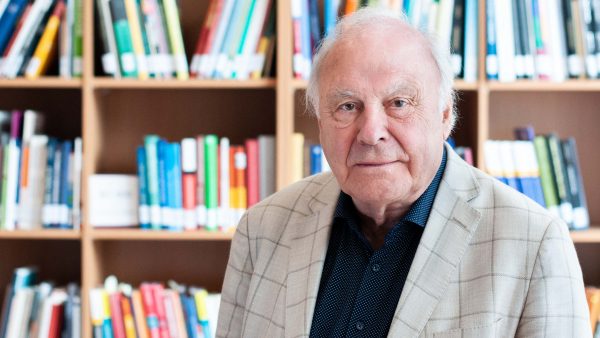WASATIA: Opening a graduate school for peace and conflict resolution
Europe Bottom Up Nr. 27 | 15.02.2022 I Dr. Udo Steinbach I The keynote addresses included in this volume were delivered at the public launches of the Wasatia Graduate School in Flensburg 2021 from Wolfgang Huber, Udo Steinbach, Ralf Wuestenberg und Zeina Barakat. Both, albeit in different terms, reflect the overall approaches of the Graduate School.
The European Wasatia Graduate School for Peace and Conflict Resolution is a trilateral PhD-Programme based at the Europa-University Flensburg and the Maecenata Foundation’s MENA Study Centre in Berlin, in partnership with universities in Albania, Israel, Palestine, South Africa, the United Kingdom, and other parts of Europe. Its task is to address the relationship between reconciliation and conflict resolution, with reconciliation being understood as a driver of conflict resolution. Given that the legal, political, and religious dimensions of reconciliation necessarily include the acknowledgment of suffering, the development of interreligious tolerance, and the analysis of entrenched narratives, the purpose of the European Wasatia Graduate School is to serve as a forum for interdisciplinary scholarship.
Our approach is threefold:
• Without law and truthfulness, there can be no reconciliation based on principles of justice.
• Without a minimum standard of legal tools and without the implementation of such tools, there can be no reconciliation within a society or between nations.
• Without truthfulness in its historical, social, and moral dimensions there can be no new beginnings.
The keynote addresses included in this volume were delivered at the public launches of the Wasatia Graduate School in Flensburg on 4 November and in Berlin on 9 November, 2021. Both, albeit in different terms, reflect the overall approaches of the Graduate School. Udo Steinbach, Director the MENA Study Centre and Co-Director of the Wasatia Graduate School and Wolfgang Huber, an influential voice within and former head of the Protestant Church in Germany, address the urgent need for a political reconciliation based on justice and truth.
Professor Huber introduces various notions of reconciliation and what can be realistically expected in the political realm. Forgiveness cannot be a precondition for reconciliation, regardless of how the notion is conceptualised within politics. Both concepts need to be distinguished clearly. Huber focuses on the ambivalent memory of events that took place on 9 November in Germany; 9 November 1989, a day remembered as the liberation from oppression in East Germany by the fall of the Berlin Wall and 9 November 1938, the night where synagogues burned across Germany under the Nazi regime.
Professor Steinbach focuses on the relationship between reconciliation and conflict resolution. He also addresses the question of the role of Europe concerning the education, history and practices of reconciliation as the conflict over Palestine/Israel remains arguably the most protracted, far-reaching, and destabilising one of our time. In his contribution, Udo Steinbach raises key questions, such as: How can reconciliation work out between people who have struggled over such a long period? How can reconciliation replace hatred and righteousness on both sides? What is Europe’s role in this? Steinbach believes that Europe’s attractiveness lies with its values – such as freedom of the people, their right to autonomy, the rule of law equally applied to every citizen, and the state taking care of those in need. Liberty, democracy, political stability, economic prosperity, and technological development are tremendous challenges for the future of the Middle East.
The European Wasatia Graduate School for Peace and Conflict Resolution has a trilateral focus (Israel, Palestine, Germany), but the programme and its participants benefit from lessons learnt from conflicts in places such as Northern Ireland, Albania/Kosovo and different parts of Africa. These are the research areas of some of the programme’s 12 PhD students. Whereas Germany, South Africa and others have completed their democratic transitions, in many African countries as well as in Balkans and in Northern Ireland, such a transition may still be underway. These countries may have signed historic agreements, but remain in permanent danger of conflict due to the fragility of their democratic systems.
In the cases of Palestine and Israel, however, notions of transitional justice remain highly contested. There is evidence that “Reconciliation” is the prerequisite for a new stable order in the Middle East, Europe’s close neighbour. There, political, ethnic and religious conflicts of the last decades have shaken the political order and social structure in a way that makes reconciliation an essential part of returning to a prosperous political and human coexistence.
The mission of the European Wasatia Graduate School for Peace and Conflict Resolution is to use academic research to complement peace processes, by means of research, education, and providing excursions and summer schools. The results of the research will be published in the Monograph Series „Reconciliation and Conflict Resolution“ (ReCo), Darmstadt: Wissenschaftliche Buchgesellschaft (wbg). The series also disseminates reconciliation-oriented research on other pressing conflict areas around the globe.
Die Autor*innen:
Dr. Zeina Barakat is a sociologist. She is a research associate at the trilateral European Wasatia Graduate school for Peace and Conflict Resolution of the Europa University Flensburg.
Prof. Dr. Dr. Wolfgang Huber is a lutheran theologian. He taught at several German universities and was Bishop of the Church of Berlin-Brandenburg and Chairman of the Council of Protestant Churches in Germany.
Prof. Dr. Udo Steinbach is an oriental scholar. He was the director of the German Orient Institute in Hamburg, and is now the director of the MENA Study Centre at the Maecenata Foundation.
Prof. Dr. Ralf Karolus Wuestenberg is a lutheran theologian and teaches at the Europa University in Flensburg, Germany. He is the director of the trilateral European Wasatia Graduate school for Peace and Conflict Resolution.
You will find here pictures from the opening events: https://www.uni-flensburg.de/trilateral-graduate-school/fotogalerie






